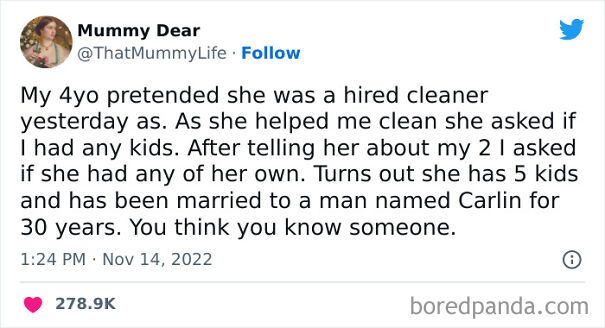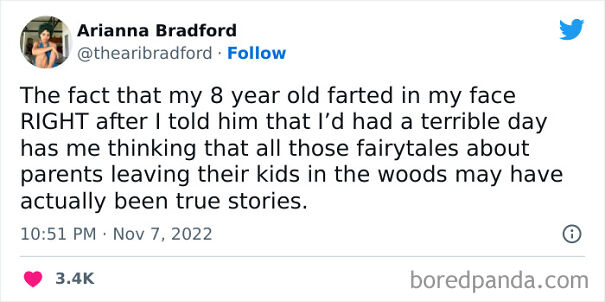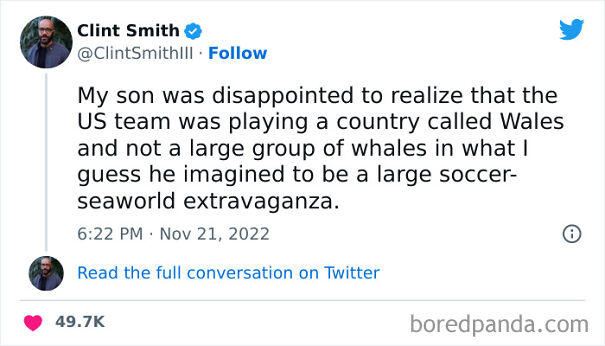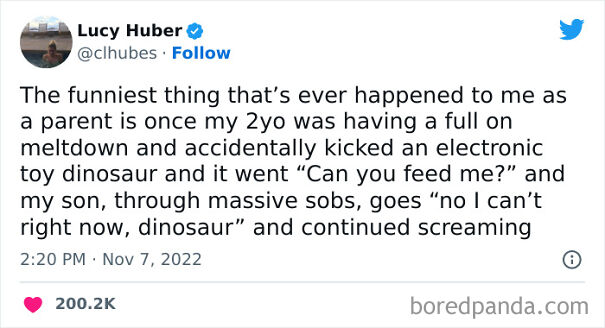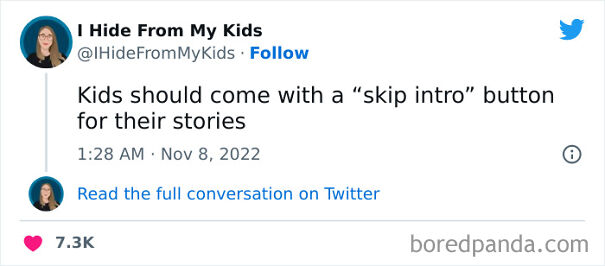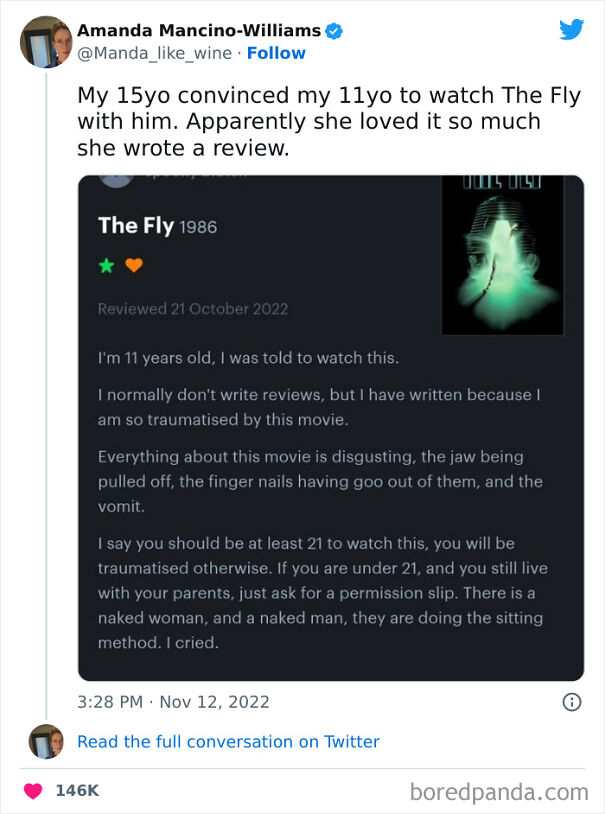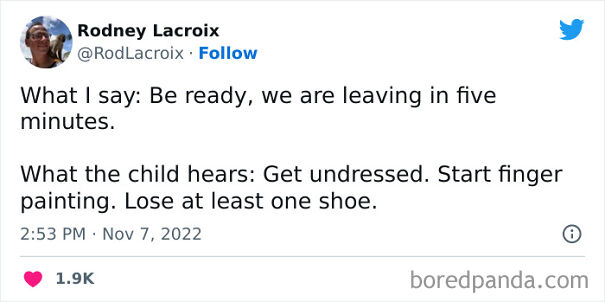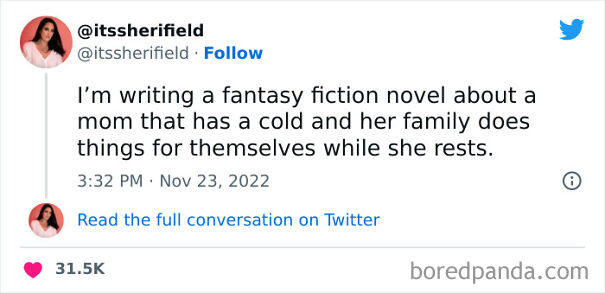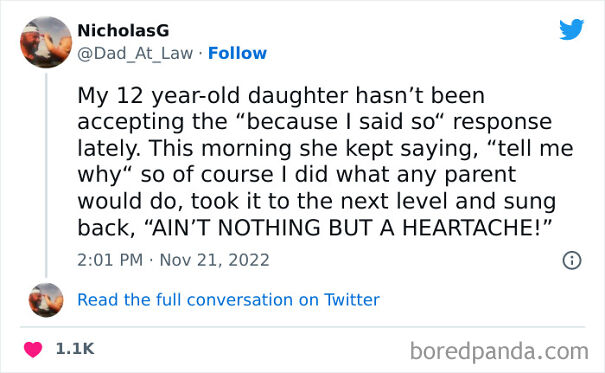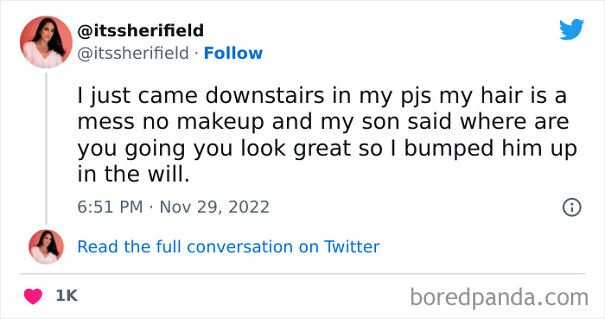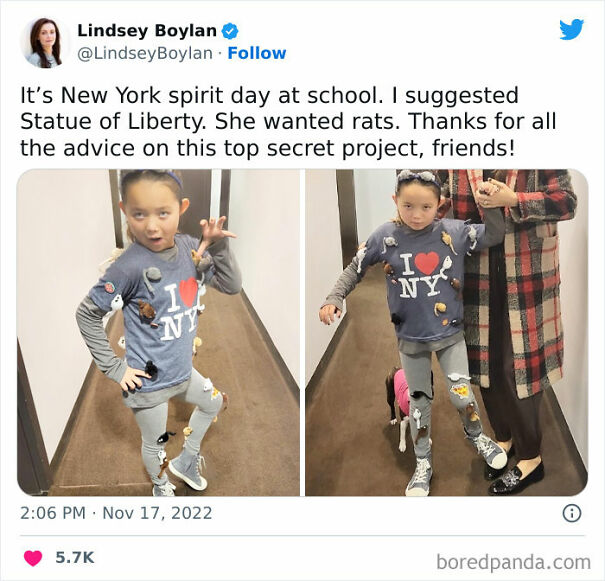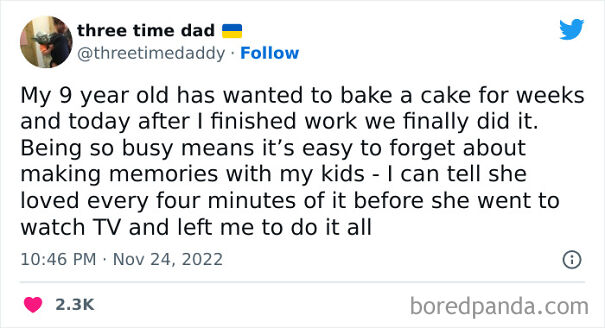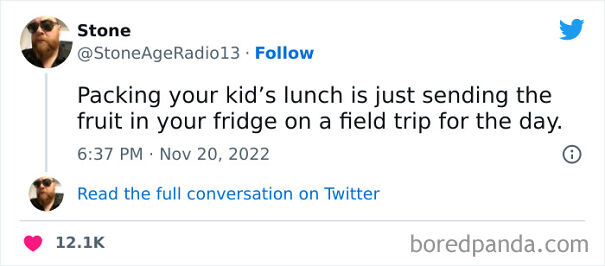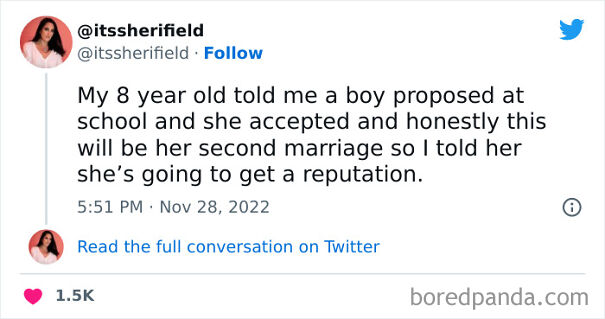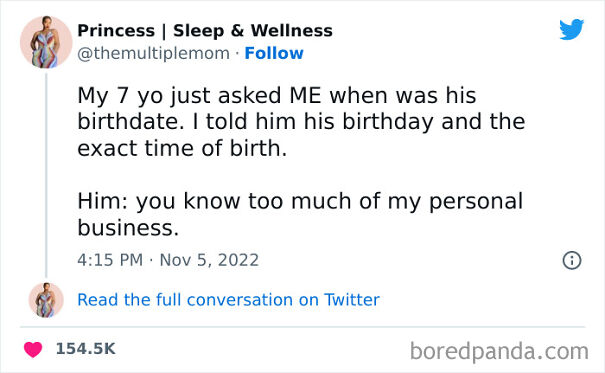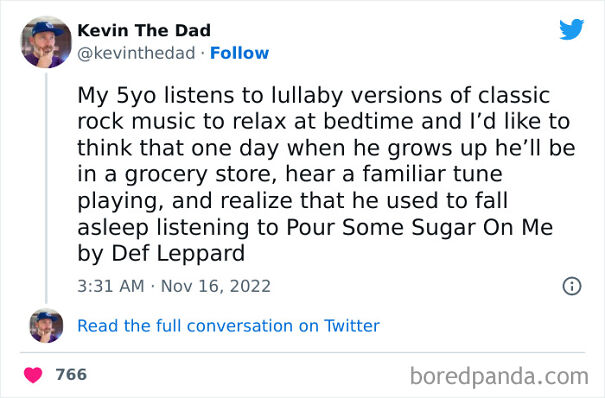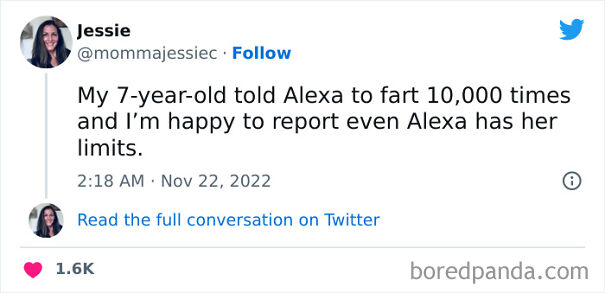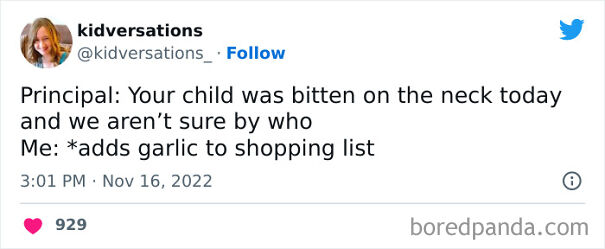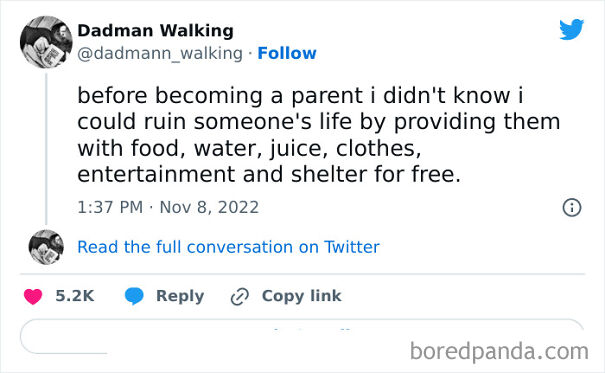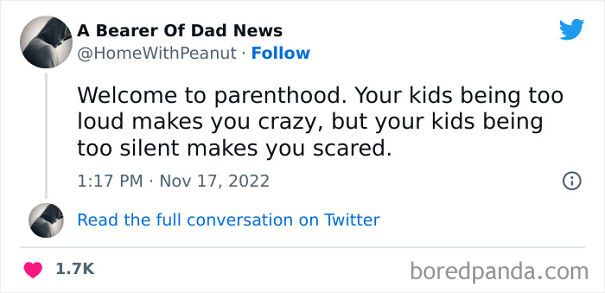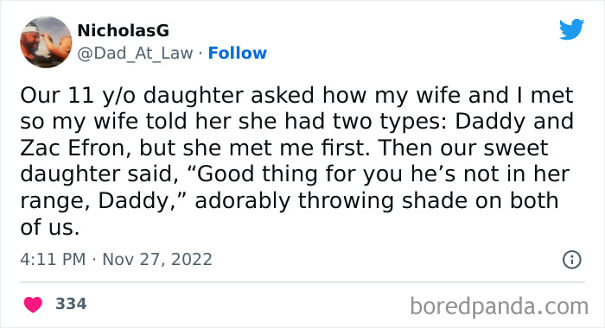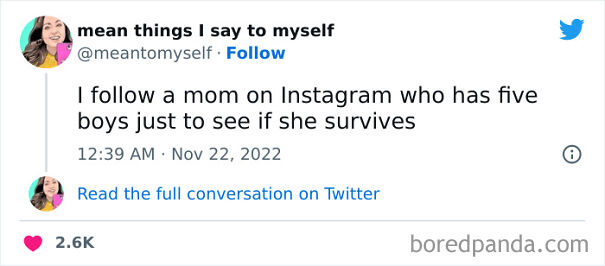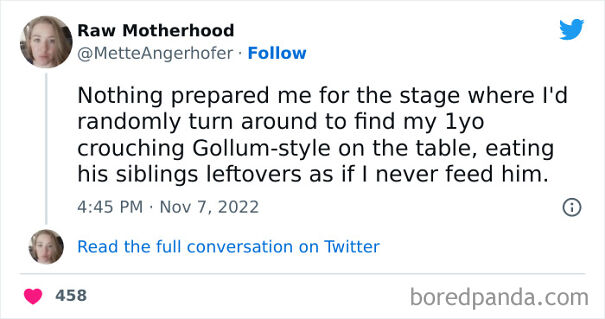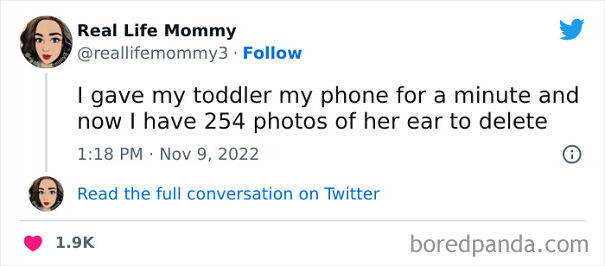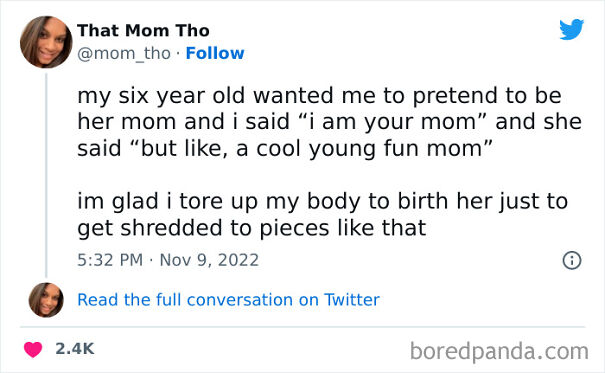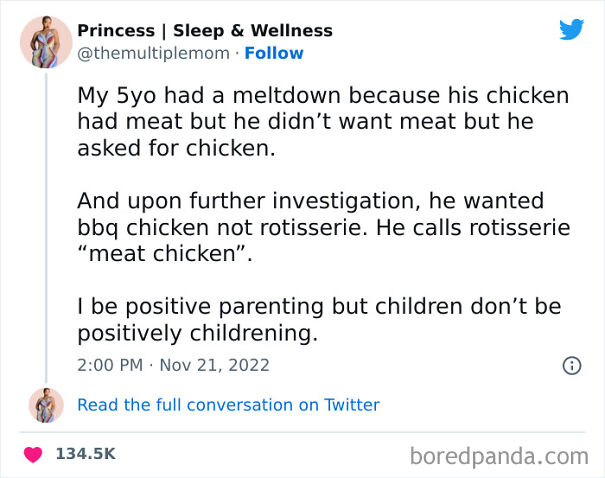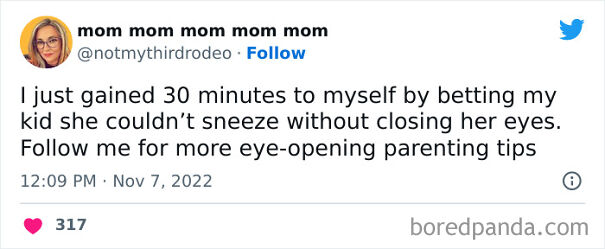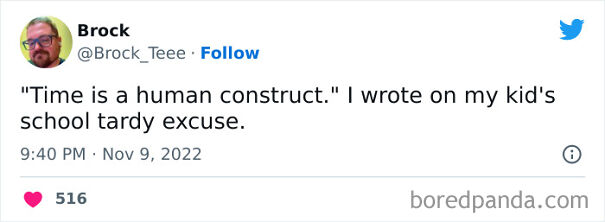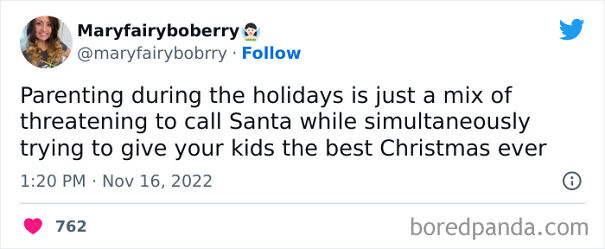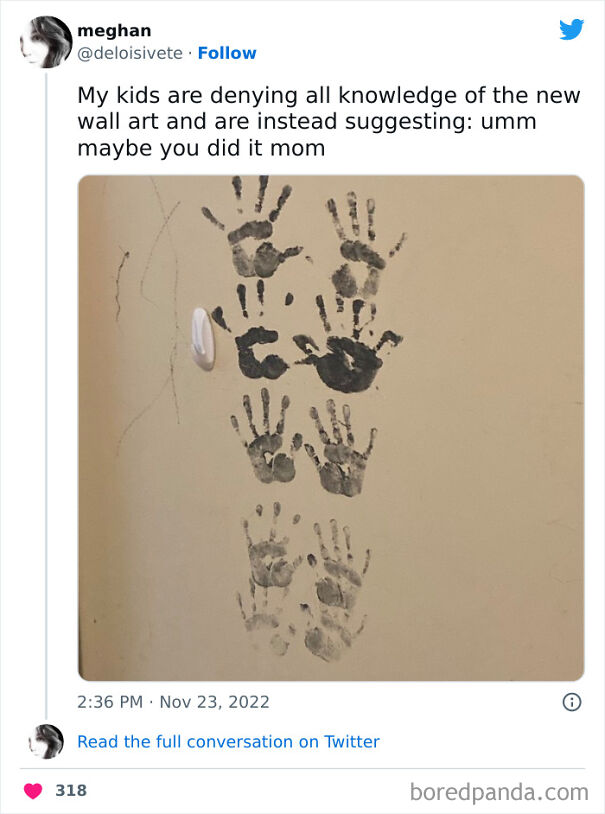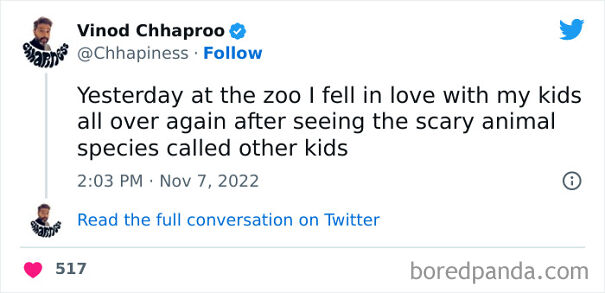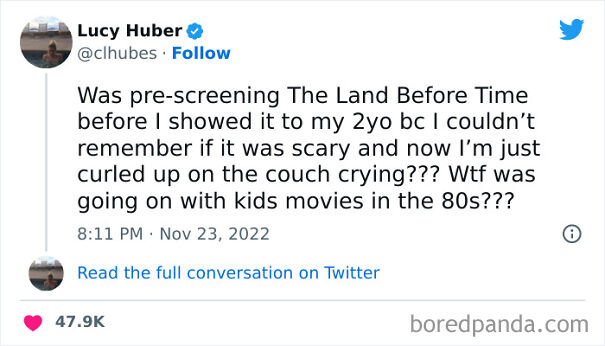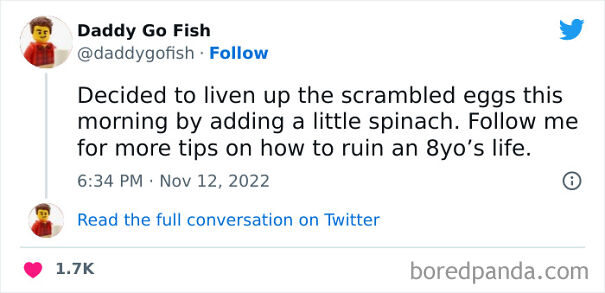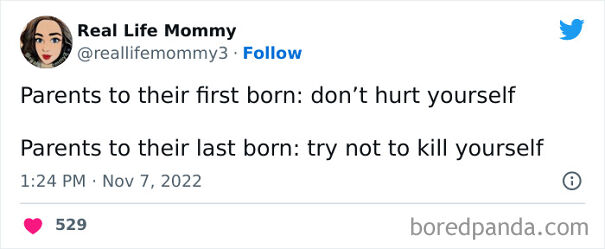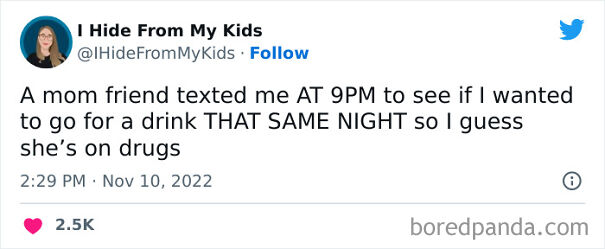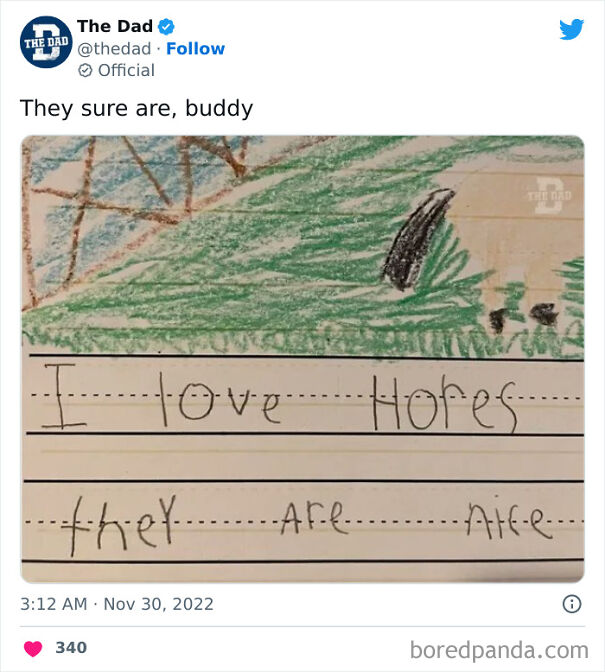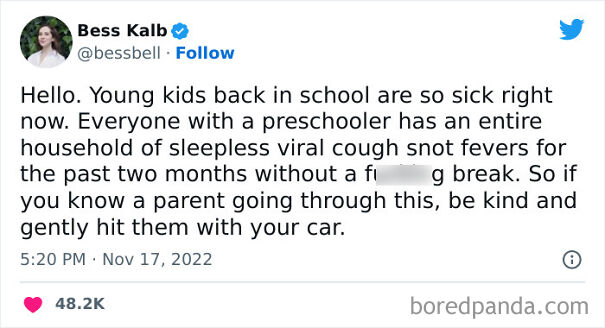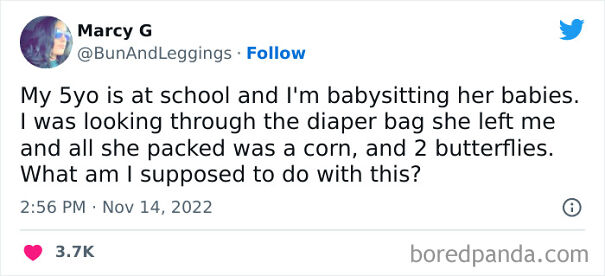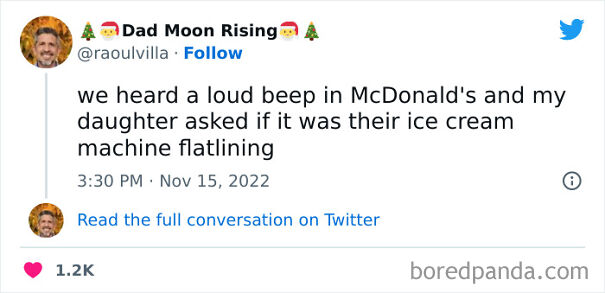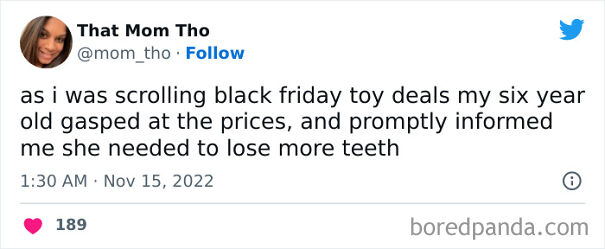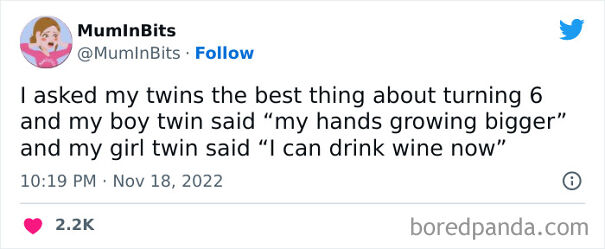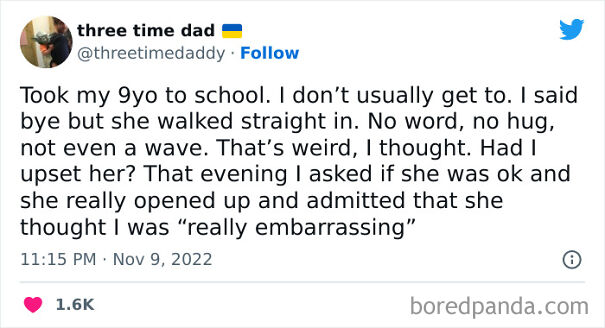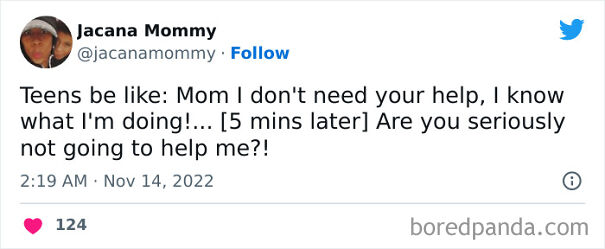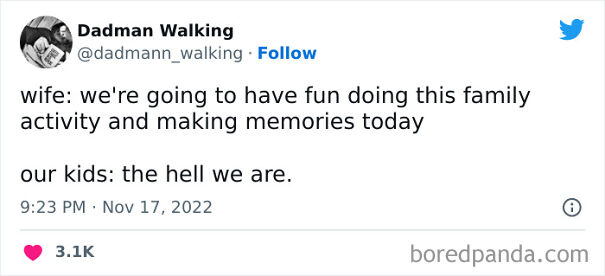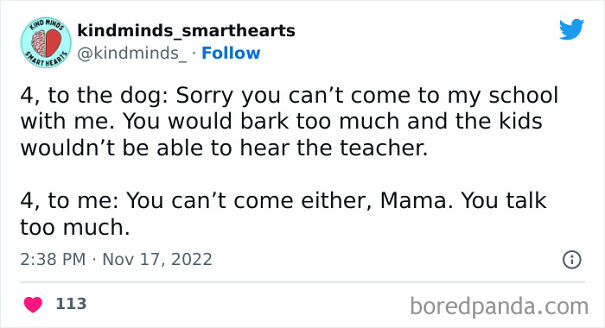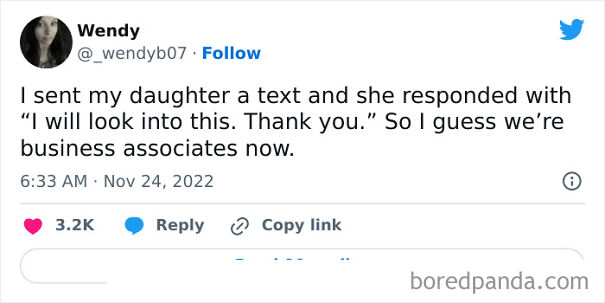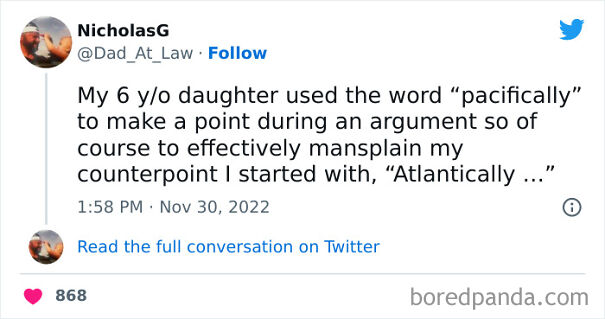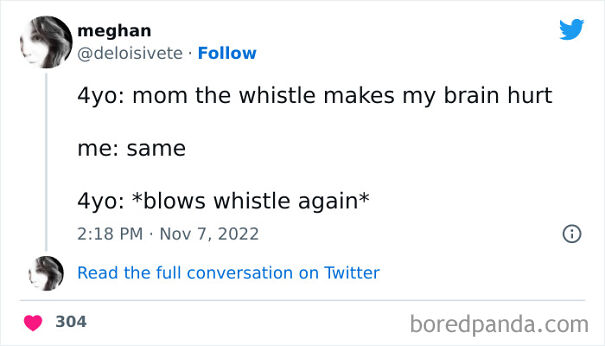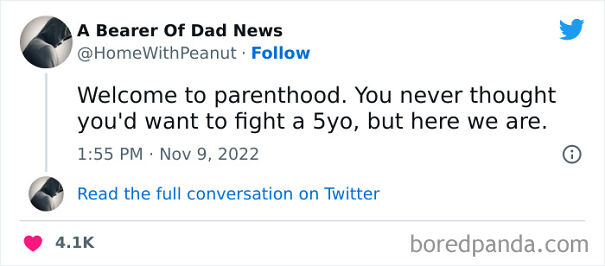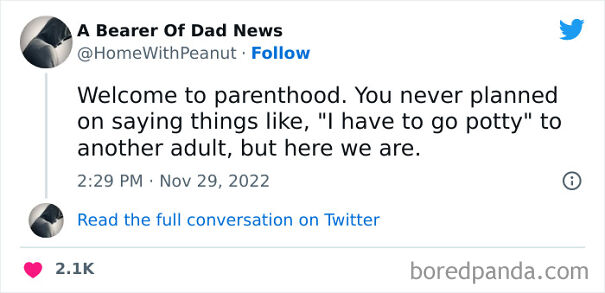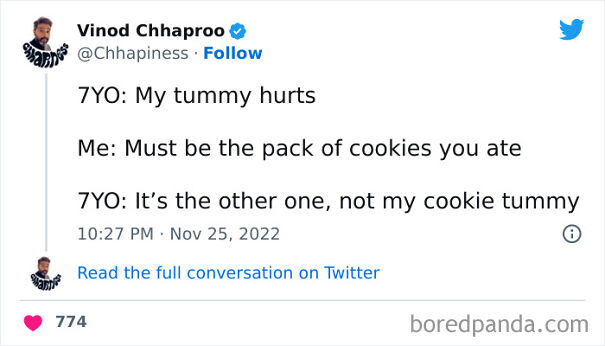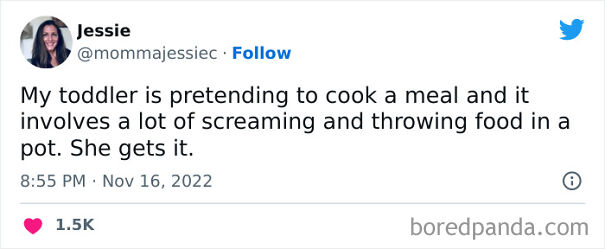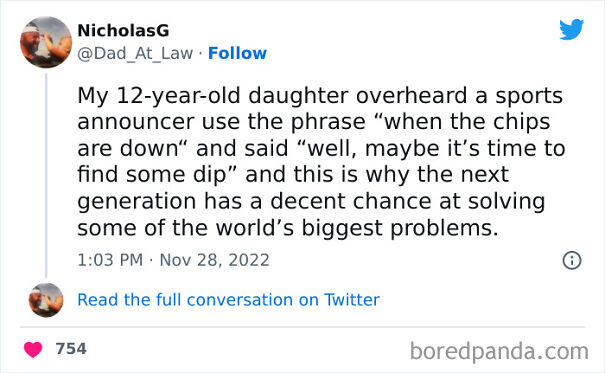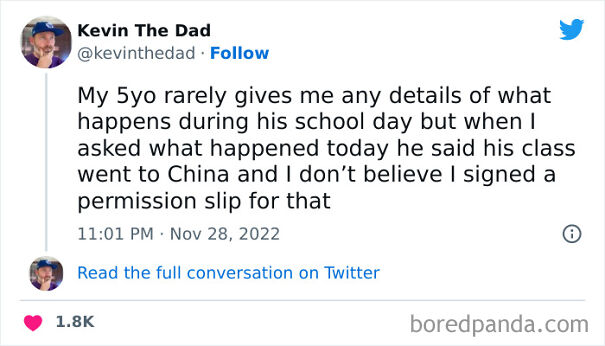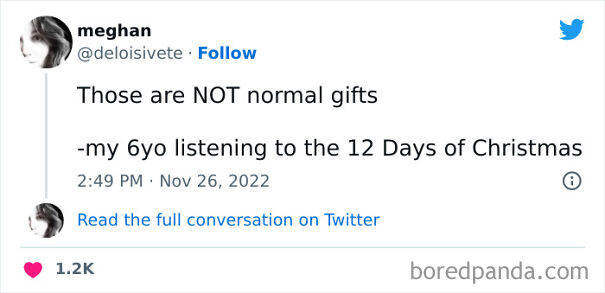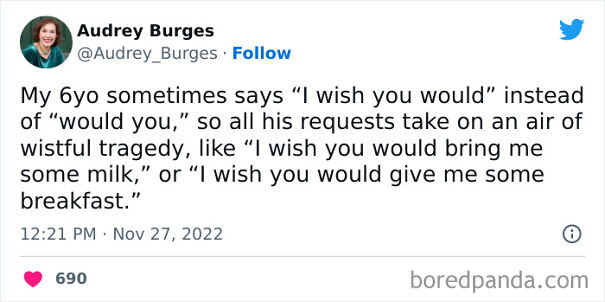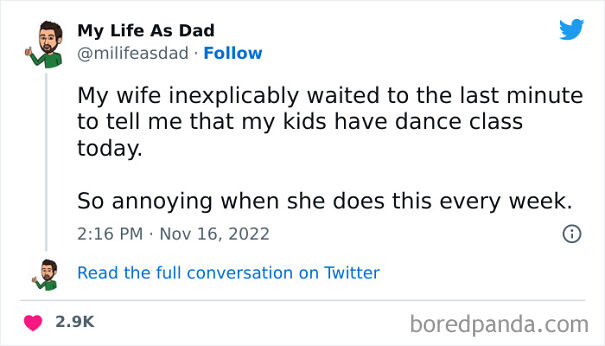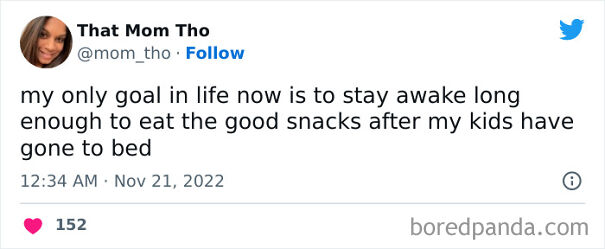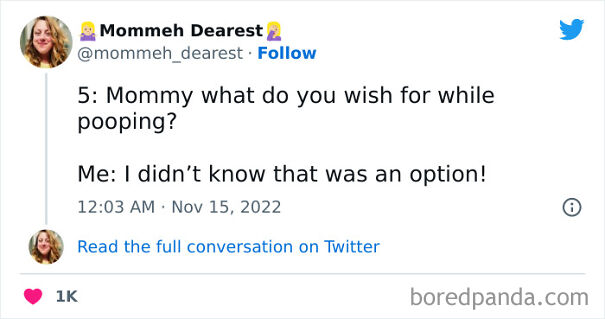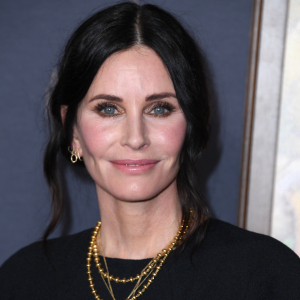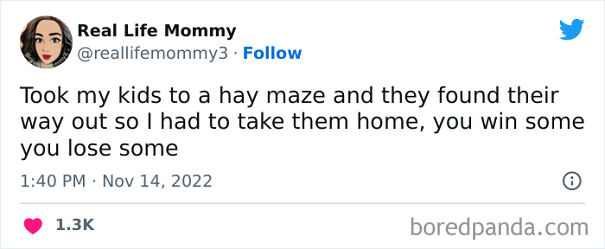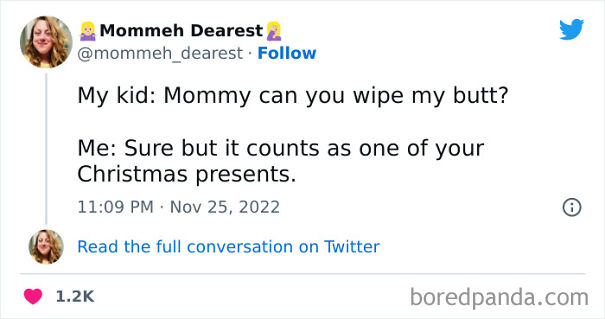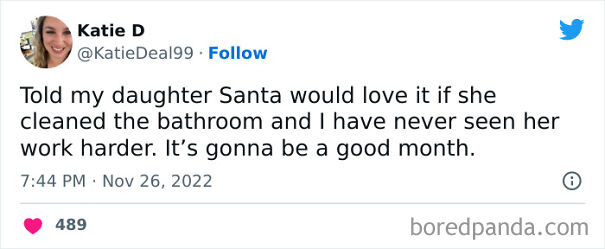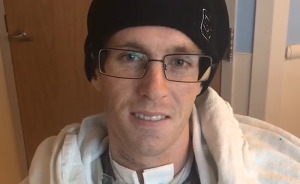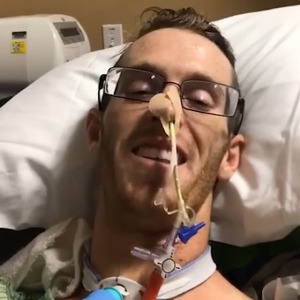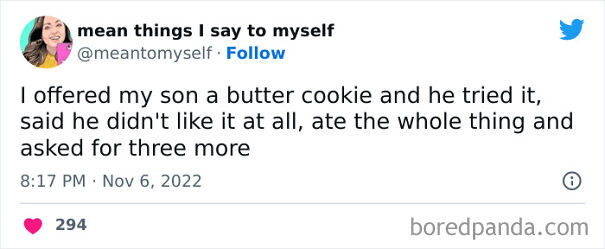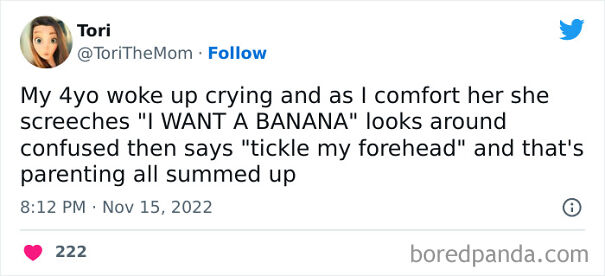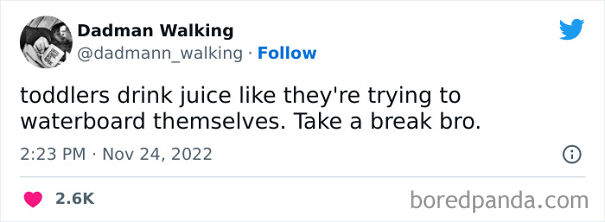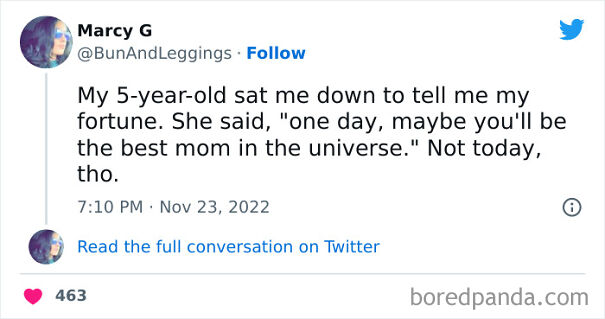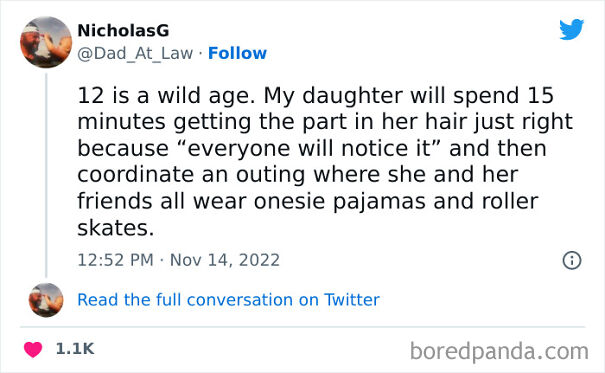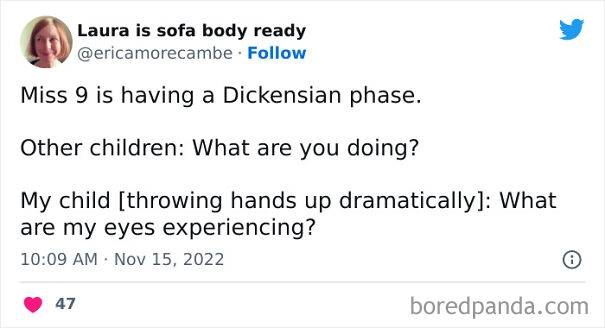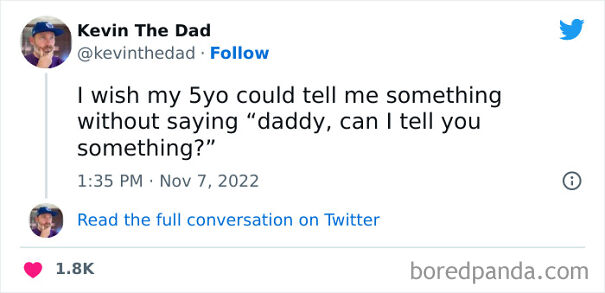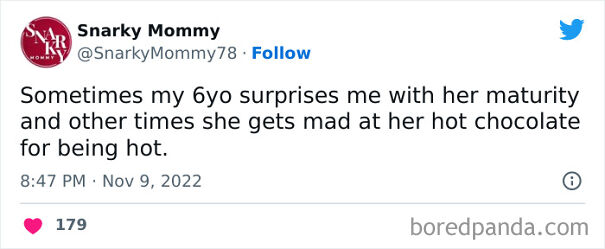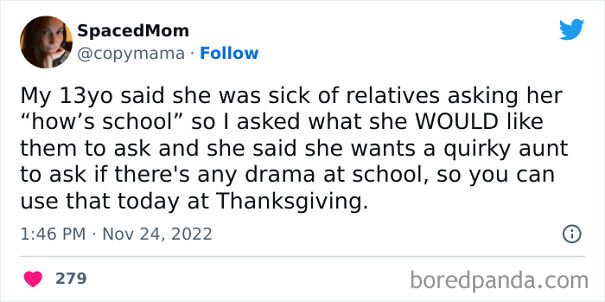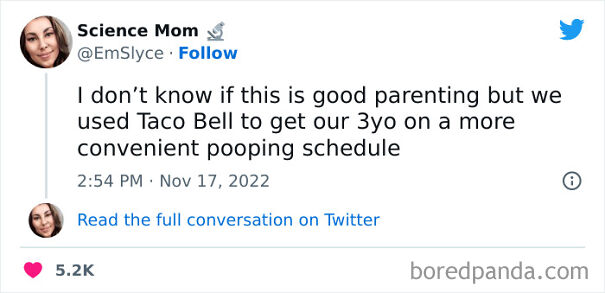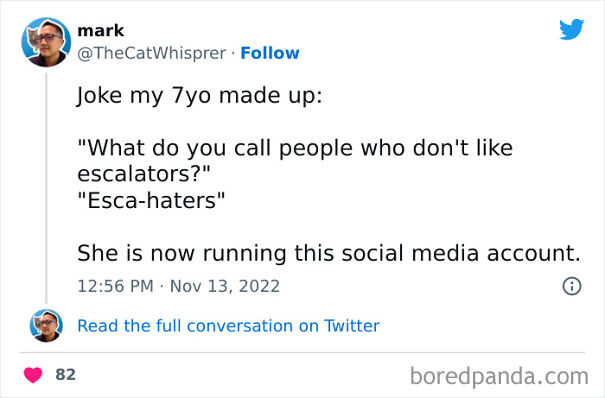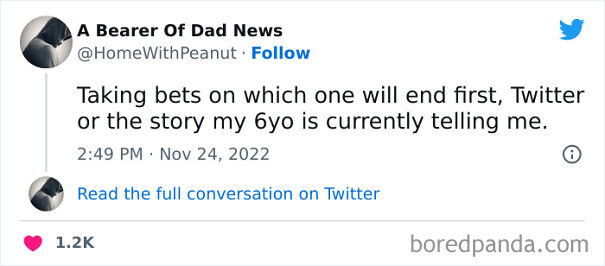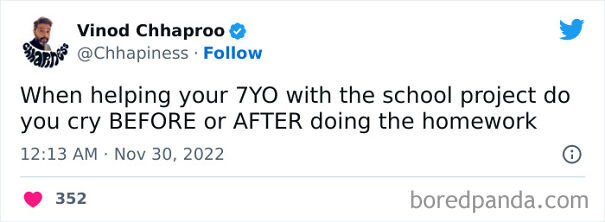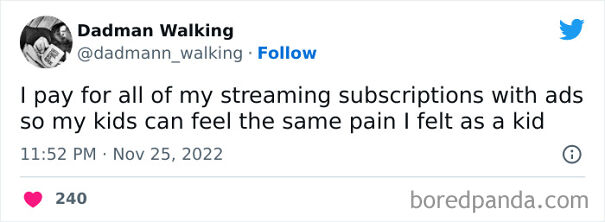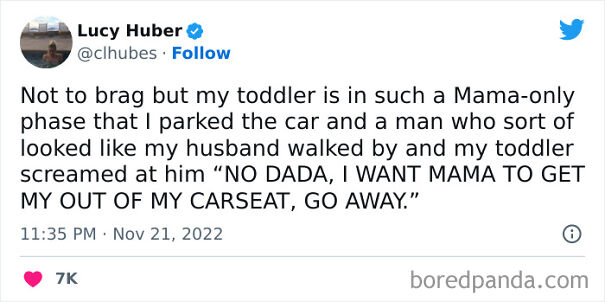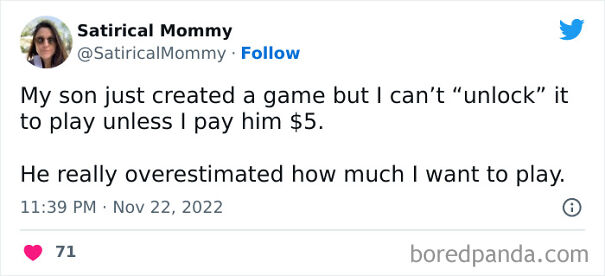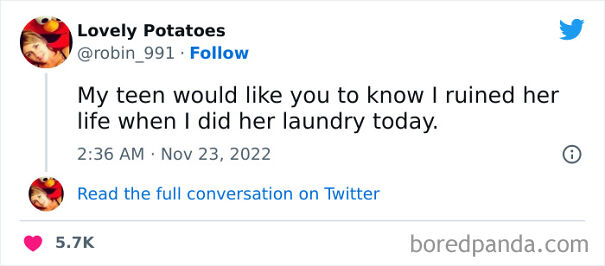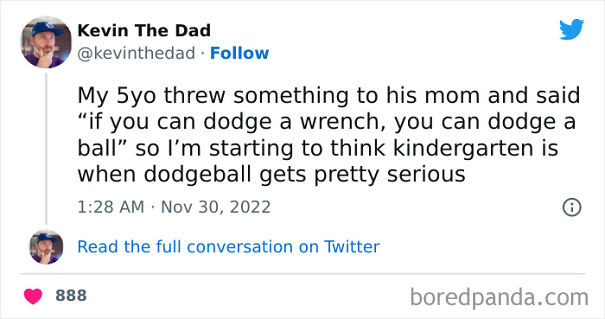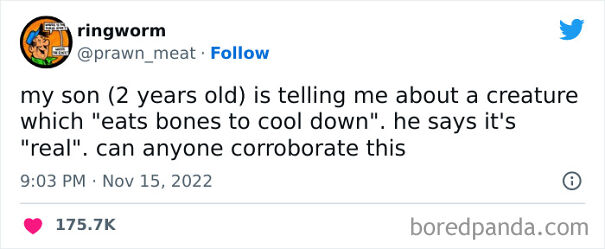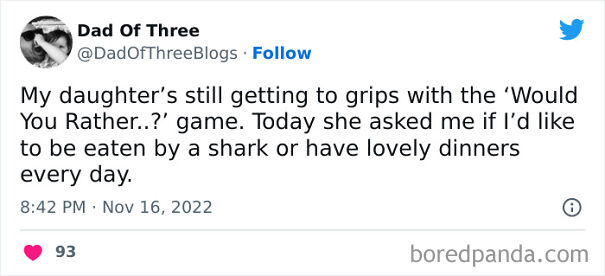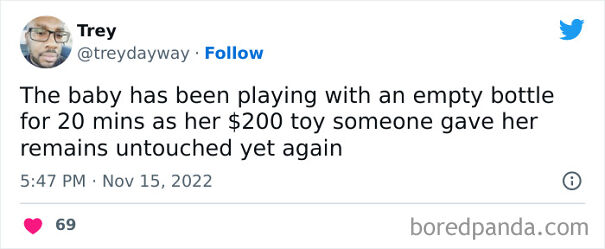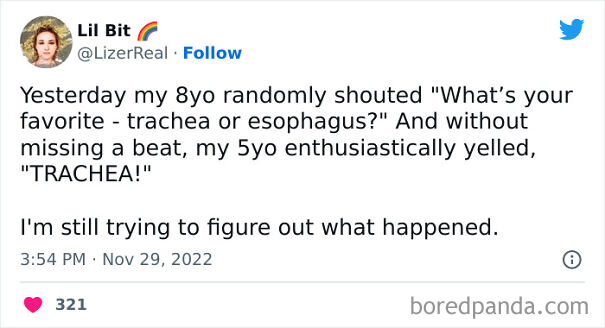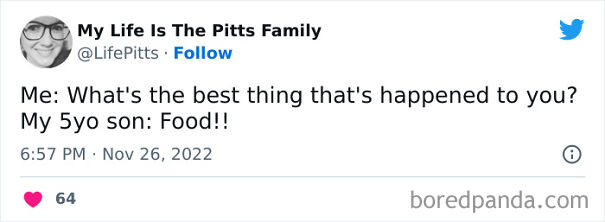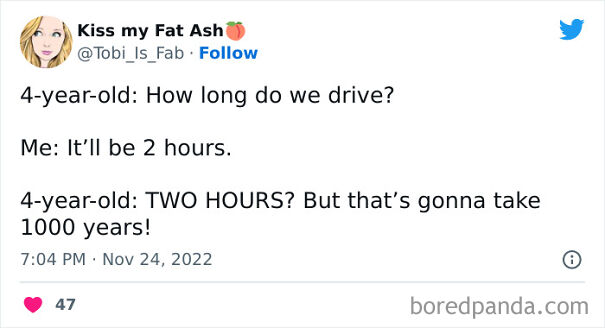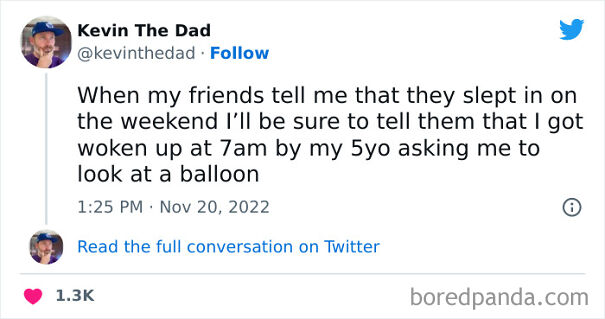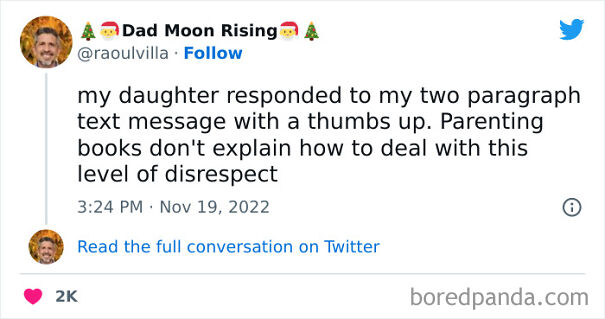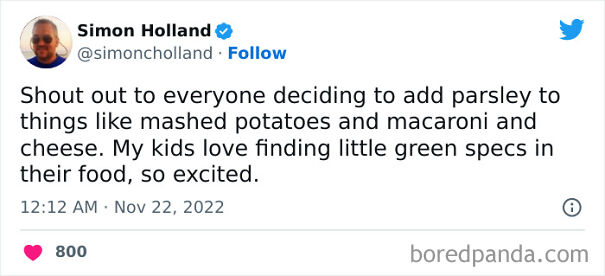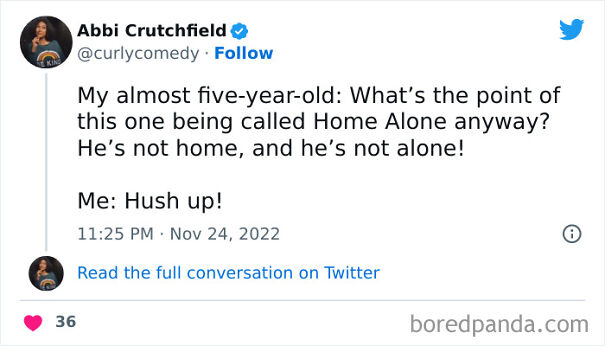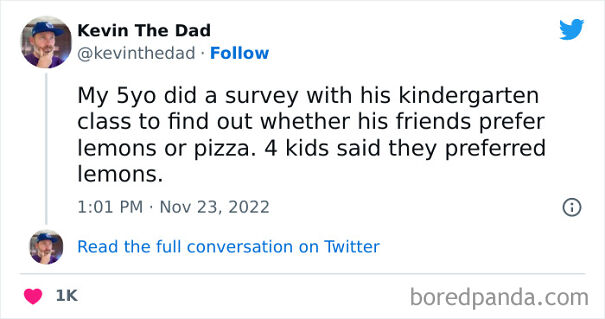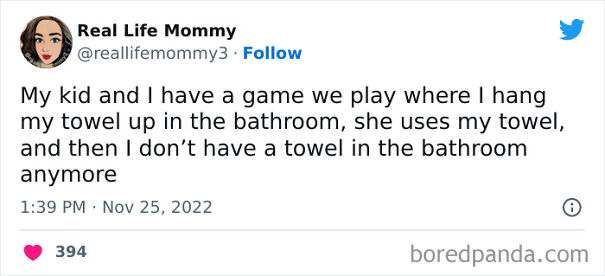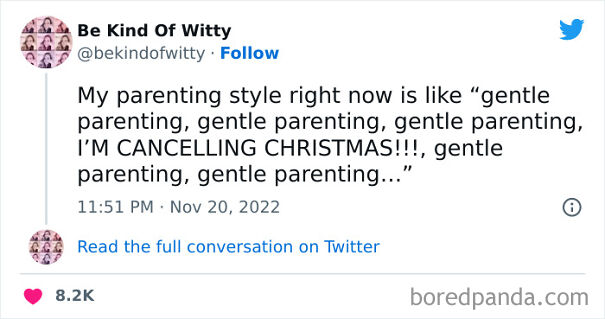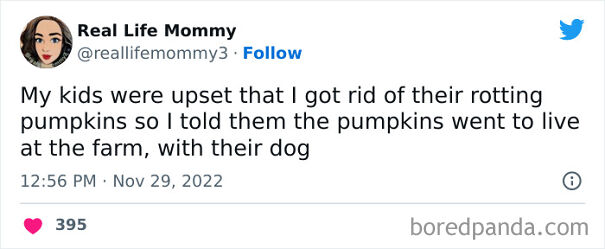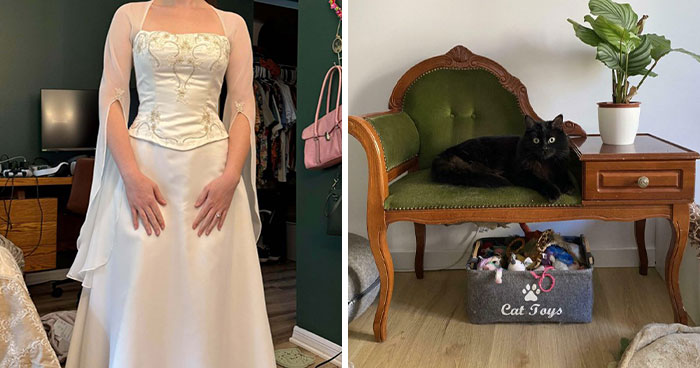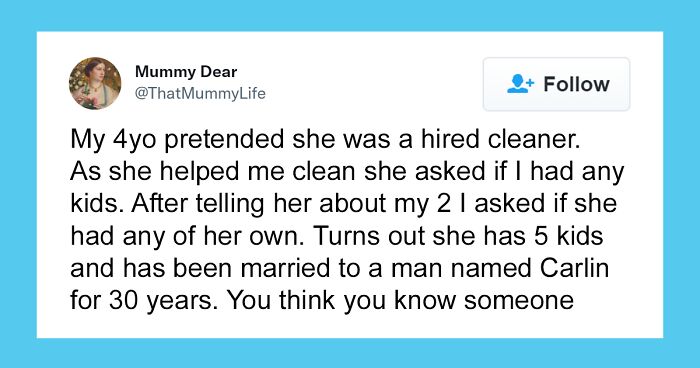
30 Of The Funniest And Most Relatable Tweets From Parents Who Were Just Trying To Get Through November
We’re all just winging it and pretending like we know what we’re doing, aren’t we? Parenting doesn’t really come with a manual. We might think we’re ready for everything because we’ve read every book and blog we could get our hands on. But the reality of raising a teeny tiny human being into a happy and functioning member of society is very different from pure theory.
It’s challenging in weird ways that are beyond hilarious when you stop and think for a moment. That is if you find a moment to spare. You know, in between tidying up the chaos of your home for the third time today (who spilled the Legos again?) and trying to convince your kid to eat something besides dinosaur-shaped chicken nuggets (the trick is to pretend that pieces of broccoli are like tiny trees).
Our team here at Bored Panda has collected the funniest and most relatable tweets that parents shared this November. We hope to get you giggling, dear Pandas. Upvote the posts that you enjoyed the most as you scroll down. Do you have any recent parenting anecdotes that you’d like to share with everyone? You’re more than welcome to open up in the comments.
If you’re done enjoying this list, but feel that you still need an extra dose of laughter, you’ll find our most recent features about the parents of Twitter right here: October, September, and August.
Bored Panda reached out to Lenore Skenazy, the president of Let Grow, a nonprofit promoting childhood independence and resilience, the founder of the Free-Range Kids movement, and a writer for Reason.com, for her insights about parenting. You’ll find her enlightening comments about encouraging independence and helping kids develop positive habits below.
This post may include affiliate links.
Oh, how times have changed. Encouraging kids to be more independent was far more valued in the past than it is today. Nowadays, some parents are constantly on edge. Exhausted. And all because they feel like they have to keep an eye on their kids 24/7. Bored Panda wanted to get childhood independence and resilience expert Skenazy’s opinion on how parents can take a step back and reduce their oversight.
“When my mom waved goodbye as off I walked to kindergarten by myself, all the other moms in our town—and our country!—were doing the same,” the president of Let Grow and the founder of the Free-Range Kids movement shared with Bored Panda.
“A generation ago, it was still normal to trust your child out in the world. Today, that mindset has disappeared. Thanks to the 24/7 news cycle and rising incomes that have made it affordable to always place our kids in adult-supervised activities, taking our eyes OFF our kids has become abnormal.” The result, according to Skenazy is that parents are exhausted and kids are anxious.
I've been telling people for years that it's never too late to Hansel and Gretel your kids.
But if it helps at all,we do have dragons here in Wales so you know,that's something 🏴
We’re in a situation now where kids are “told they can’t handle ANYTHING without an adult right there!” Skenazy said that the only way for parents to finally relax is “to take the plunge.”
“That is: With another friend and THEIR kid, send your kids off to do something WITHOUT YOU: Ride their bikes, walk the dog, go to the store…anything YOU did as a kid. If you are in a seriously dangerous neighborhood, you can give them some new independence INSIDE—like having them make dinner, or babysit. But otherwise, send them out!”
This will lead to a newfound sense of independence, after your kids “come back, flushed and excited—or even a bit teary, because something went wrong.” But it’s not just your child who becomes independent: it’s you as a parent as well.
“Your fears will be replaced by pride in your spunky child. The dopamine hit of, ‘Look at my blossoming kid!’ cancels out the fear. And from now on, you will feel far more relaxed—and far more joyful—about your kid doing things on their own.”
Skenazy said that this approach really is that simple. “Trust me—I did an entire TV series, World’s Worst Mom, where I sat with terrified parents as I sent their kids outside to play, run errands, climb trees. Twelve of the 13 families became so relaxed after doing this just four times that they were UNRECOGNIZABLE. Because now they were happy!” she said.
“BOTH GENERATIONS felt happier and less stressed. Now a psychologist has started treating families with this same advice: Send your kids out to do something on their own. (Here’s a free home version.) As one mom wrote to me this week after she did exactly this—started sending her kid outside by himself even though SHE was worried and so was HE: ‘I am happy to share the millions of firsts and discoveries and victories that have followed in less than six months. But profound gratitude is the point of this email.’”
If you’d like some more information on the importance to ‘Let Grow’ by trusting your kids to do things on their own, you can visit Skenazy’s website, LetGrow.org. It’s a nonprofit promoting childhood independence. Meanwhile, teachers and educators might want to check out the free independence-building program that’s available for the whole class or school.
Meanwhile, Bored Panda was interested to hear about the key habits that parents ought to try and instill in their kids as they grow up, so they’re ready for life.
“When kids are very young—like, toddlers—they are DESPERATE to help out the family. If you’re cooking, THEY want to cook. You’re cleaning? They want to help. The key is simple: Let them! Have the chores you are sick of become the chores they automatically help you with,” Skenazy, from Let Grow, explained.
“At first, they won’t provide a lot of actual assistance. They might knock over the garbage when they’re trying to take it out. But they will be knit into family life, and they will know that you not only love them and want to give them the world, but also that you believe in them and need their contributions as a member of the family,” she said.
“As they get older—or if they are older already—you can still loop them in. Kids balk at chores, but deep down they also know that trusting them to help you is a way of saying, ‘I believe in you and I need you.’ Both of those are bracing. We all want to be part of something—not just given stuff. Think how much more you love a meal or project that you helped make. Don’t deprive kids of that satisfaction by doing everything for them.” She added that a helpful book on this is Michaeleen Doucleff’s ‘Hunt, Gather, Parent.’
Oh I totally would have left everything right were it was and walked off.
A huge chunk of being a parent comes down to reshuffling your priorities. From now on, you focus on taking care of your children first and foremost. And that means putting your own needs and free time in second or even third place.
Once everyone’s fed, clean, and clothed, you can then focus on spending some quality time together… and making sure everyone does their homework. Being present while interacting with your kids is essential for the welfare of the entire family: it just isn’t the same if you’re scrolling on your phone and wishing you’d rather be somewhere else.
That’s not to say that all parents should completely give up their hopes, dreams, and any semblance of ever having a social life ever again. Absolutely not! But parenting requires sacrifice. And until your children become (increasingly more) independent, you have to focus on their needs first.
Personally, my younger cousin in elementary school just goes to buy chips and dumps the things in his lunchbox into mine. What sucks is that he uses. My. Money.
At the same time, no parent can expect to do a good-enough job if they’re constantly exhausted, demoralized, and feel like they’re running on fumes. Taking care of your health (eating well, exercising, getting enough sleep) is an investment in the entire family. You can’t neglect that.
If you fall apart, burn out, or get seriously ill, who’s going to take care of your kids? It’s a marathon, not a race. And you need to keep your energy and spirits up because there will be plenty of problems down the line. It’s inevitable.
Naturally, parenting is far easier if you’ve got a proper support structure in place. There is no possible way to overstate just how vital it is to have a partner who helps you when it comes to childcare.
Or what it truly means to have relatives who can consistently lend a helping hand when it comes to babysitting. Or how great it is to have friends and neighbors who are parents themselves, whom you can turn to for help and advice.
Old folks like me remember when Meatloaf was a rebel against the world, when the Beatles were long-haired hippies, when any female lead singer was a fallen woman. Now their music sells cookies. But then again, Ice T is selling cereal, so there you go.
There are tons of people worried about AI like Alexa spying on us etc etc... i'm not worried at all because all they're gonna hear from my house is c**p like this! and the kids shouting "go back to the beginning" every 7 seconds 10 times in a row! They will stop listening to my house pretty darn quick!! :D
Having someone to lean on when the going gets tough makes all the difference in the world. But part of that means putting your pride aside and directly asking for help: not everyone’s a mind reader; not everyone might see that you’re struggling. If nobody's available for a friendly and supportive chat, reaching out to a therapist for help can help, too.
Practically all parents want their kids to grow up healthy, happy, skilled, and successful. At the end of the day, what parents do is help guide their kids and shape their values. They help prepare them for life in the ‘real world.’
Previously, psychologist Eileen Kennedy-Moore, Ph.D., explained to Bored Panda that children learn about how the world works in several ways. “Children learn from observation of what others do, but also through explicit teaching and explanations, and through experience and observation of how others respond to certain actions,” she said.
According to Dr. Kennedy-Moore, as people grow and mature, they tend to develop more empathy for others.
"In general, we become more empathic at 19 than we were when we were at age 9, and that continues, so we're more empathic at 29 than 19, at 39 than 29, simply because we've experienced more of life, so it's easier for us to put ourselves in someone else's shoes," she shared with Bored Panda during an earlier interview.
According to the psychologist, there are 3 key ‘ingredients’ that help children care about other kids and grownups. The first is being able to imagine how others think and feel. This ability to imagine someone else’s perspective, according to Dr. Kennedy-Moore, generally begins around the age of 4. It then grows “with age and experience.”
One of my nephews had a phase where that was the only way he would pee into the toilet was to crouch on the seat Gollum style (Or as he called it, "Pee like a frog"). His parents just went with it; I guess if it's going into the toilet, that's forward progress at least
The second thing that’s needed is for kids to learn to manage their distress. "Kids don't have the bandwidth to respond kindly to someone else if they are overwhelmed by their own feelings." Lastly, there’s a need for children to truly believe that they’re actually capable of helping others. "If they don't think they can help or don't know how, they're likely to freeze or avoid situations where someone is upset,” the psychologist told us.
"Parents can help by talking about people's thoughts and feelings as they come up in books, movies, or real life. This gives children a window into people's internal life that helps with perspective-taking. Parents can help children manage their own emotions by naming those feelings as well as teaching specific coping strategies such as distraction, deep breathing, counting to ten, or using words to ask for what they want," the expert said.
Woah, that's a steep requirement.. Best I can do is be an uncool old and sad mom.
My child pitched a fit one day because there were peanuts in her peanut butter. Apparently chunky was the only kind my aunt had.
"Parents can guide children toward seeing themselves as helpers by talking about how children's kind actions impact others. For instance, they might say, 'That was kind of you to help your brother with his block tower. He was sad when it fell down, and he felt happier when you helped him build it up again.' Or, 'Thank you for helping me put away the groceries. I'm happy that we got the job done quickly.'"
The psychologist added that acknowledging good intentions and describing other people’s feelings can help move past any mistakes that kids make. “For instance, you could say, 'I know you're excited about going on the swings, but your sister also wants to swing, and she's sad that she hasn't had a turn yet.' Then, to move forward, you could ask, 'What can you do to help her feel better?' or 'What would be fair to everyone?'"
While exploring the realities of parenting today, it's important to remember the power of art and individual expression. As you guide your children towards independence and individuality, consider offering them creative outlets that echo personal experience. For example, the therapeutic benefits of artistic expression can be profound, as highlighted in a portfolio of artwork created to manage chronic pain during challenging times in November.
Creative expression can serve as a valuable tool for children and parents alike to explore emotions and relieve stress.
This calls for the birth scene from Monty Python's "Meaning of life"... "Ohh, get that, would you, Deirdre?" https://www.youtube.com/watch?v=AsWxkU0g9Z4
*the tooth fairy looked in her wallet and left quietly for another planet*
Yeah but watch that 5 yr old. Rules? They don’t need no stinking rules. Just saying.
Sophisticated. Everybody at the corporate will hate his emails.
Lol I bet they learn a lot faster after that prezzy count gets low
My husband pulled the “If you don’t stop that, Santa is not going to come this year” one too many times. (He tends to do these over the top hollow threats for some reason instead of enforceable consequences). The kids informed him that Santa always comes and just must be ignoring his calls.
For a minute I thought the kid was going to measure something
I used to be the best mother in the world, then ... I had kids 🤷🏼♀️
Did you hear the joke about the girl who worked in the coke crushing factory?
One of the weird things about going from being a single parent to getting married is the strange, almost jealous feeling of not being the “number one and only” anymore. However I know I am extremely lucky for the wonderful father my husband is to my girls (whose biological “father” is an absent ex). He’s their Dad no matter what their birth certificate says.
Who buys a baby a $200 toy? $20 is the limit until at least 4 years old... Unless it's a bike
My favourite was the John Lewis one where the brave snowman battled the elements to get his snowgirlfriend a present: a lovely warm scarf. So what he was actually doing all along was trying to kill her.
The famous words of Cricket Green "Years! But that could take months!''
Remember this next time she messages you about her latest drama 😉😈
Today while making lunch I cut off the tip of my finger. Don't worry, just the very tippy tip. But there was quite a lot of blood. I wrapped my finger in a paper towel, finished making lunch, served lunch, got disapproving scowls over what I served for lunch, then I went to the bathroom, cried to myself, calmed myself down, bandaged my own finger, cleaned up the blood in several areas of the house, and then I got some laundry out of the machine and hung it up because my kid needs dry laundry by this evening. Today I am not a big fan of parenting or adulting.
oh, you poor dear. here, have a good, long grandma-style hug, cuz those are the best hugs...
Load More Replies...Today while making lunch I cut off the tip of my finger. Don't worry, just the very tippy tip. But there was quite a lot of blood. I wrapped my finger in a paper towel, finished making lunch, served lunch, got disapproving scowls over what I served for lunch, then I went to the bathroom, cried to myself, calmed myself down, bandaged my own finger, cleaned up the blood in several areas of the house, and then I got some laundry out of the machine and hung it up because my kid needs dry laundry by this evening. Today I am not a big fan of parenting or adulting.
oh, you poor dear. here, have a good, long grandma-style hug, cuz those are the best hugs...
Load More Replies...
 Dark Mode
Dark Mode 

 No fees, cancel anytime
No fees, cancel anytime 


